Mike Nichols’ Carnal Knowledge (1971): Criterion Blu-ray review
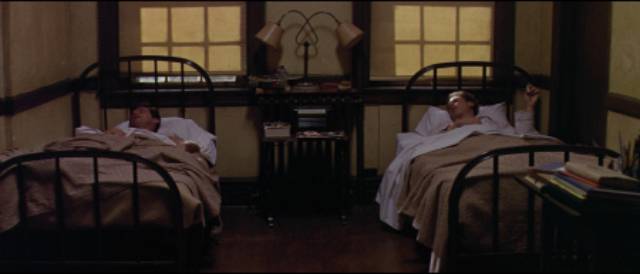
After three decades of trying to keep a lid on all kinds of moral transgressions in movies produced by the Hollywood studios, the Production Code unravelled during the seismic social changes transforming the United States during the 1960s. The declining power of the studios in the wake of legal challenges in the ’50s and the rise of television ran headlong into a generational rebellion against post-war conservatism and women’s attempt to throw off the constraints of restrictive gender roles. These shifts rendered the Code untenably anachronistic and in 1968 it was finally replaced with the rating system which still holds sway over movies screened in the U.S.
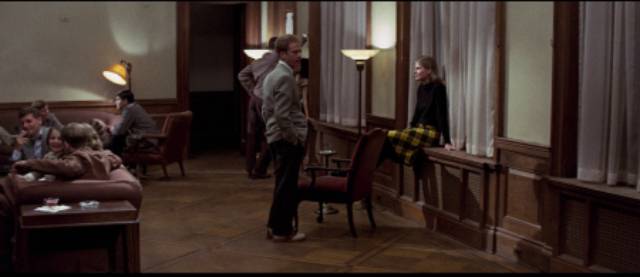
The first film to completely ignore the Code and go into release with an advisory warning that it was “suggested for mature audiences” was Warner Brothers’ adaptation of the Edward Albee play Who’s Afraid of Virginia Woolf? (1966). This was the first movie directed by Mike Nichols, who had begun as an actor and improvisational comedian in the ’50s and turned to directing for the stage in the early ’60s. His immediate success made him one of the most-awarded theatre directors of his generation, so it’s perhaps not surprising that Hollywood came to call, or that his first feature should be an adaptation of a stage success. The movie played to his strengths as a director of actors, but also displayed a deft understanding of the possibilities of the camera; aided by the masterful Haskell Wexler, Nichols created a searing, claustrophobic psycho-drama which is visually dynamic without falsely “opening up” the material. The film stays uncomfortably close to the characters without flinching from the kind of language and sexually-charged material Hollywood would have deemed impossible just a few years earlier. In an indication of the on-going sea change in Hollywood, this brutally “adult” movie won five Oscars and was nominated for eight more, including one for Nichols himself, an achievement comparable to that of Orson Welles with his own first feature, Citizen Kane (1941).
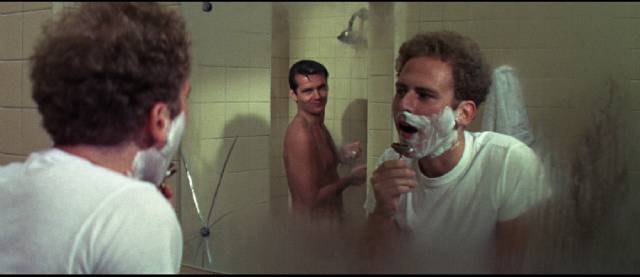
This began Nichols’ parallel careers on stage and screen which continued until his death in 2014, although his filmmaking eventually became less radical and challenging from the mid-’70s on. The early years, however, marked him as one of the most interesting and accomplished directors of that turbulent period, a status not in question today, although his early films received a mixed reception from critics who seemed uncomfortable with what he was doing to popular cinema. Who’s Afraid of Virginia Woolf? was followed by the hugely successful The Graduate (1967), which in turn was followed by Nichols’ biggest and most ambitious production, an adaptation of Joseph Heller’s anti-war novel Catch-22 (1970). A critical and commercial disappointment, this blend of horror and slapstick farce displayed a remarkable development in technique, with enormously complex shots involving characters in conversation while surrounded by a fleet of planes taking off or crashing in the background. The variety of performance styles among the large cast don’t always mesh comfortably, but the sheer ambition of the film and its striking visual beauty show Nichols stretching his abilities, and his understanding of cinema as a means of creating emotional and psychological effects – and meaning.
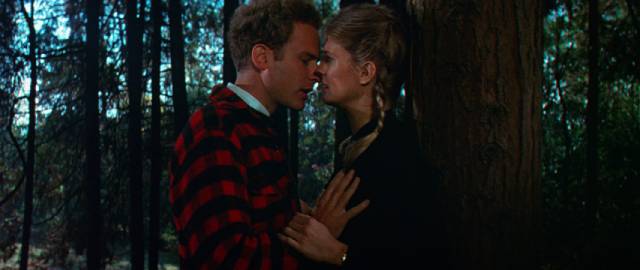
He was still finishing that exhausting project when he was sent the script for an unproduced play by Jules Feiffer. Attracted by the material itself, he also found its small, intimate scale appealing after what he had just been through, and Carnal Knowledge (1971) quickly went into production, becoming one of the most controversial films he ever made as it pushed the new freedoms of Hollywood to their limits. Its not difficult to understand the mixed response the film received at the time from a critical community which was itself undergoing radical changes in the face of the sexual revolution and then-current social upheavals. After all, it has a single-minded focus on sex – not the physical act itself (though some did label it pornographic), but rather the attitudes surrounding the act, most particularly male attitudes. Carnal Knowledge seems fresher and more pertinent now for its acute dissection of toxic masculinity, perhaps a source of confusion at the time since it complicates the viewer’s response to its paired protagonists.
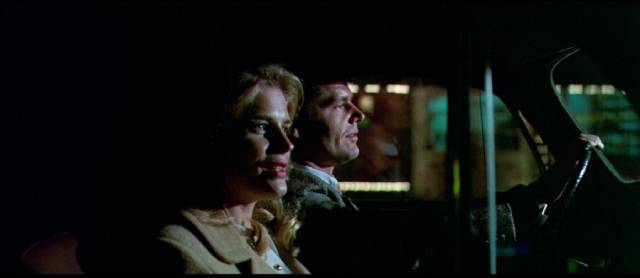
Jonathan (Jack Nicholson) and Sandy (Art Garfunkel) seem like opposites, but as their friendship unfolds across three decades it becomes clear that they are two sides of the same coin – Jonathan is overtly unpleasant, while Sandy’s unpleasantness is concealed beneath a deceptive softness and seeming sensitivity. Jonathan is a clear avatar of what feminism was opposing, while Sandy is able to slip beneath the critical radar by apparently aligning himself with women’s efforts to extricate themselves from male dominance.
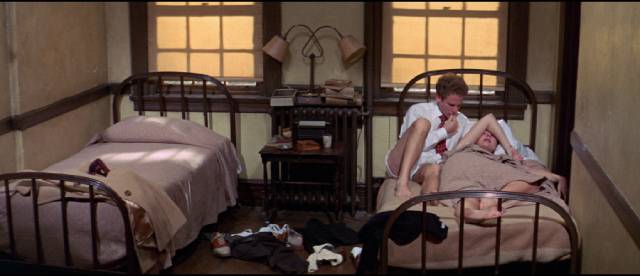
Beginning in 1946 with the two friends sharing a dorm room at college, having just missed the war and the opportunities it might have afforded to prove themselves, it seems that all their energies are directed towards getting laid. Lying in their twin beds, they talk into the night about what they so desperately want; for Jonathan, it’s a hot body with big tits; for Sandy, its a nice personality and warm emotional connection. Not surprisingly, the aggressively outgoing Jonathan mocks his friend.
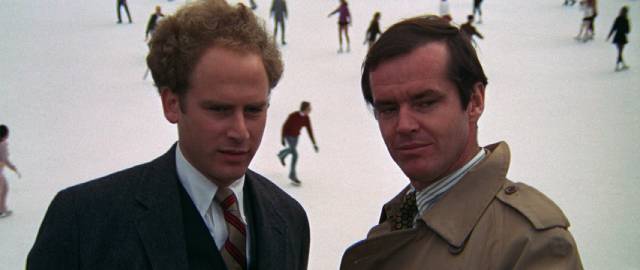
This discussion is heard over the titles, which play on a black screen. Then we get the film’s first bravura shot, an elaborately choreographed dance of the camera with the characters, which moves from exterior darkness, out of which Susan (Candice Bergen) emerges into light, a physical manifestation of the two friends’ dreams; the camera follows her into a frat house where a rather dull mixer is in progress. As she passes Jonathan and Sandy, the former asks his friend if he wants her? Sandy is interested, so Jonathan says he gives her to him, instantly relegating her to the status of object devoid of agency. The shot continues through a lengthy, socially awkward moment as Sandy approaches her, attempting to signal both interest and disinterest simultaneously, before retreating without a word and admitting he screwed up. But when Jonathan suggests he take over, Sandy returns for another attempt. All through this, Susan shows her awareness of what’s going on and eventually she speaks first, saying she hates these parties. Visibly relieved, Sandy agrees … but the ensuing conversation reveals that Susan is far more self-aware and attuned to the social game they’re engaged in, running circles around Sandy and tying him in rhetorical knots for her own amusement.
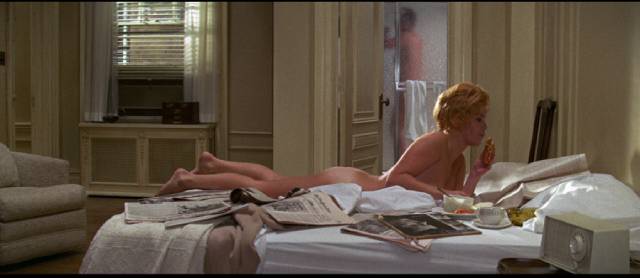
Here, right at the start, Feiffer’s script reveals its key strategy: while the movie is about the two men, and on the surface they dominate every situation, it’s the female characters whose point of view is really most significant. The men take their position and their “rights” for granted, but it’s the women who, because of their social position, are necessarily more aware of what they must do to navigate through waters over which they have only limited control. Susan might be playing a defensive game, and only have limited influence over outcomes, but she’s certainly a more skilful player than Sandy.
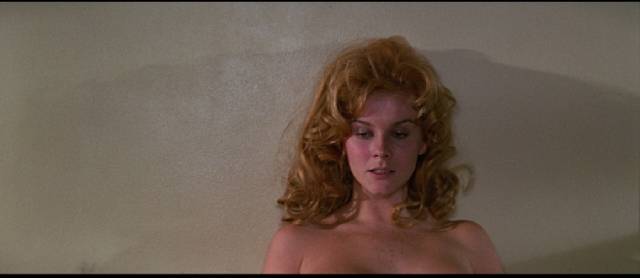
As she and Sandy begin dating, Jonathan pushes his friend for every new detail, mocking him for going too slowly, for not feeling her up, for still not having had sex. Then, after Sandy has pressured Susan and received a hand-job, Jonathan immediately sees her as “that kind of girl”, the kind who’ll put out, and pursues her behind Sandy’s back. His brashness does make him seem more exciting than the dull and “sensitive” Sandy and, although she continues to date Sandy, Jonathan is the first man she has sex with. And having “conquered” her, he becomes increasingly possessive, insisting that she tell Sandy about her relationship with him. But unwilling to hurt Sandy, she eventually rejects Jonathan … whose attitude towards women and sex has ended up damaging everyone involved, even if Sandy doesn’t actually know what’s happened.
Jumping ahead to the late ’50s, we find the two friends living in New York, where both have successful careers. We learn that Sandy married Susan, that they had a child, but have since divorced. One of the striking characteristics of the film is that once the two men have finished with a woman, we never see her again – the one constant in their lives is each other, though this has nothing to do with some kind of suppressed homosexual bond, just an acknowledgement that for these men women always remain “other”, objects of desire but also of resentment because of the power which that desire has over the men.
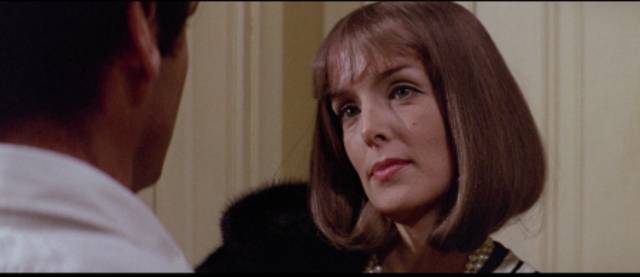
Though older now and supposedly more mature, they still talk about women in the same ways, remaining in essence the horny adolescents they’ve always been. The second act focuses on Jonathan and the latest woman in his life, Bobbie (Ann-Margret), a model who embodies everything he says he wants in a woman; she’s voluptuous and sexy and, most importantly, draws attention to him – and by implication, his sexual prowess – when they’re seen together in public. But things turn sour quite quickly. He insists that she give up her job and remain permanently available in their home, trying to confine her to the conservative female role against which ’60s feminism pushed so hard. It’s stifling and depressing and she begins drinking and taking pills in an attempt to relieve the boredom. Jonathan’s effort to regain her purely as an object for his own pleasure paradoxically makes her increasingly less desirable. It also becomes clear that underlying his incessant womanizing lies a fragile and unreliable virility, his failures with Bobbie initially offset with bitter jokes, but soon feeding an anger which, in Jack Nicholson’s hands, carries an implicit threat of violence.
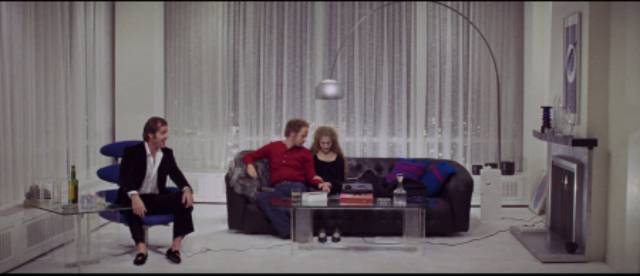
While Jonathan and Bobbie’s relationship implodes, Sandy is involved with Cindy (Cynthia O’Neal), who reflects changing times by seizing control and being as aggressively self-interested as Jonathan. Naturally, Jonathan tries to switch his attention to her and, in one of the film’s most unpleasant scenes, he attempts to engineer a partner swap, sending Sandy to the bedroom where Bobbie lies drunk with the suggestion that he essentially rape her, while he tells Cindy that Sandy has said it’s okay for her to fuck him. Disgusted, she leaves, and he discovers that Sandy is on the phone calling for an ambulance since Bobbie has attempted suicide. Such clear evidence of rejection – from both Bobbie and Cindy – leaves Jonathan with nothing but impotent rage.
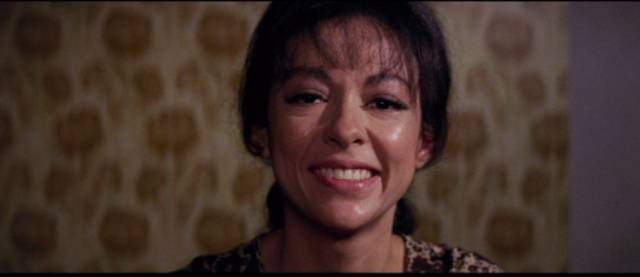
Jumping ahead again, to the end of the ’60s, Jonathan has nothing but his misogynistic bitterness to cling to, running a slide show for Sandy and his new girlfriend of all the women who’ve passed through his life, from childhood crushes up through Bobbie, to whom he now resentfully pays alimony. Among the images on the screen in his unsettlingly impersonal modern apartment, there’s a flash of Susan just as he speaks of his first sexual experience. He says it was a mistake and quickly goes to the next slide and it’s not entirely clear whether Sandy registered the significance. However, the new girlfriend, Jennifer (Carol Kane), has had enough and gets up to leave in disgust.
Walking together at night, Sandy tells Jonathan that he’s finally found what he needs, someone who is teaching him who he actually is. Jennifer is so much wiser than himself … and she’s also still a teenager, perhaps younger than his own daughter. His passive “sensitivity” is still getting him what he wants from women, while Jonathan’s aggressive approach has become a dead end. In the film’s final scene, he visits a prostitute, Louise (Rita Moreno), who has to follow exactly a script he’s provided – and which they have obviously played many times – in order to produce an erection, ironically placing this woman in the position of power as he orchestrates a fantasy in which he is supposedly the one in control.
*
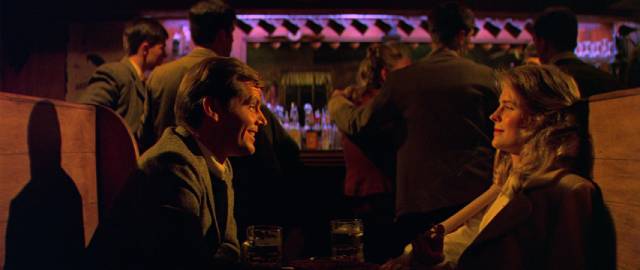
This caustic view of male behaviour is built into Feiffer’s script, but Nichols’ treatment, his visual and editing style, adds a great deal of nuance, which along with the superb performances, make Carnal Knowledge as pertinent today as it was in 1971 and even more illuminating because the culture has since caught up with the film’s insights.
Although it’s set in three particular periods, the production design doesn’t belabour the point; everything is stripped down to essentials, relying on performance more than set dressing to establish the three different time frames – somewhat paradoxically, since the two main characters don’t seem to grow out of their adolescent attitudes towards women as they make their way towards middle age. Visually precise, with cinematographer Giuseppe Rotunno using subtle lighting effects to signal both time changes and the characters’ psychological states, Nichols uses several strategies to illuminate the thematic elements underlying the narrative, ranging from that long single-take which establishes the social and psychological factors which shape the interactions between Jonathan and Sandy and between Sandy and Susan to a repeated use of close-ups in which characters speak directly into the camera, situating the audience in the position of the person being spoken to in the scene.
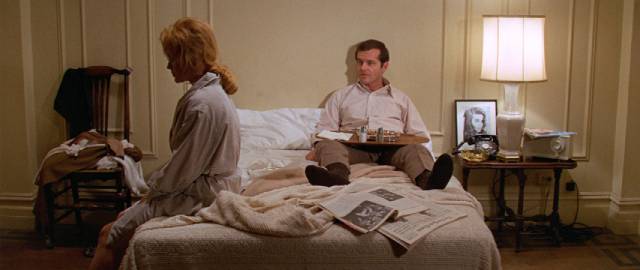
Most significantly, though, Nichols frequently holds on a character who is observing or listening to what is happening or being said by someone off-screen; it’s a film about reactions and the effect on those who are seemingly in a subordinate position in terms of the characters’ power relationships. This means that the viewer is often identifying with the women rather than the men they have to engage with; on its surface, the film is all about male desire, arrogance and aggressive self-confidence, but Nichols’ visual strategy transforms it into a feminist critique of those things, even though the women themselves are still trapped in oppressive social circumstances – until, that is, Cindy rejects the bullshit. Carnal Knowledge is a masterclass in the ways meaning is constructed in cinema not so much through the literary qualities of the script, but by the ways in which the filmmaker chooses to shoot and edit the script’s dramatic possibilities.
*
The disk
Criterion’s release uses a recent 4K restoration by StudioCanal which provides a detailed, finely-textured image which serves Rotunno’s subtle cinematography well. The mono soundtrack focuses, not surprisingly, on dialogue, with a subtle use of naturalistic effects to ground the often emotionally wrenching scenes. There’s no traditional score, but a background use of diegetic music – pieces by Tommy Dorsey, Glenn Miller and Frank Sinatra – helps to establish each act’s period as well as comment on and counterpoint the content of scenes.
The supplements
Several supplements provide context and illuminate the film’s themes, beginning with a commentary from filmmaker Neil LaBute, an appropriate choice given the shadow Carnal Knowledge so obviously casts over his own work, particularly the equally bleak In the Company of Men (1997).
There’s a discussion between Nichols’ biographer Mark Harris and critic Dana Stevens (29:04); a conversation between Nichols and filmmaker Jason Reitman, an enthusiastic admirer, from 2011 at the Film Society of Lincoln Centre (36:02); a Q&A with Feiffer from 2019 in which he discusses the origins of the script (43:20); plus a piece about editor Sam O’Steen’s approach to cutting the film (19:14). Finally, there’s a trailer (00:57) and a radio spot (00:58).
The booklet includes an essay by scholar Moira Weigel and a reprint of an article by Herb A. Lightman from a 1971 issue of American Cinematographer.
Comments